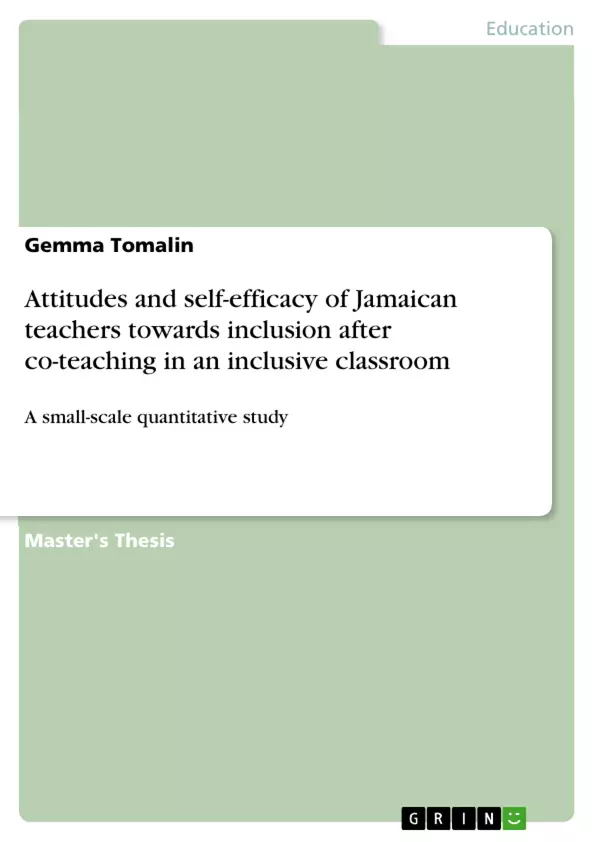This study should bring awareness to the Ministry of Education and Teacher Training Colleges that traditional lecture style training without relevant practicum may be preventing the facilitation of inclusion. Despite Jamaica's Ministry of Education having established an inclusive education policy in 2008, the majority of children with special needs are kept at home. With very little inclusion in schools and segregation of students with special needs (SWSN), teachers in Jamaica have not experienced inclusion and do not feel adequately equipped to facilitate it.
Literature shows that teachers with experience only in traditional classrooms, and no exposure to diverse students are likely to be resistant to, or unable to, implement inclusion. Teachers also tend to implement inclusive teaching methods and adopt better attitudes after hands-on experience, modelling with a co-teacher.
Five teachers participated in a 2-week training condition, each teacher was provided with an inclusive classroom and an experienced inclusive teacher (mentor). The first week the teacher is assisting the mentor, the second week the mentor assists the teacher with lesson planning and teaching. Teachers were given 2 self-rating questionnaires before and after training to measure whether their attitudes and self-efficacy improved and whether a direct measure of attitude and self-efficacy towards inclusion could be predicted after training. Another questionnaire was given 2 weeks after training that measured the potential success of training through implementation.
Using paired sample t-tests for both attitude and self-efficacy scores it was found that all 5 teachers could be predicted to show an increase in both attitude and self-efficacy scores after training. It was also found using independent sample means tests that teachers without any previous experience teaching SWSN gained a larger difference in attitudes compared to teachers who already had experience however there was no difference in gains in self-efficacy.
Table of Contents
- Chapter 1 Introduction
- Chapter 2 Literature Review
- 2.0. Introduction
- 2.1. Attitudes towards inclusion and integration
- 2.2. Experience of and Exposure to Inclusive Classrooms and SWSN
- 2.3. Teacher Self-efficacy in Inclusive Teaching
- 2.4. Co-Teaching
- 2.5. Conclusion
- Chapter 3 Methodology
- 3.0. Introduction
- 3.1 Sampling
- 3.2 Training
- 3.3 Procedures
- 3.4 Instruments
- 3.5 Threats to Validity
- Chapter 4: Data Analysis and Results and Discussion
- 4.0 Introduction
- 4.1 Descriptive Results
- 4.2 Hypothesis Testing
- 4.3 Inferential Analysis
- 4.4 Implementation
- Chapter 5 Conclusion, Recommendations and Limitations
- 5.0. Conclusion
- 5.1 Limitations and Recommendations
Objectives and Key Themes
This research aims to evaluate the impact of a 2-week co-teaching training program on Jamaican teachers' attitudes and self-efficacy towards inclusion. The study explores the effectiveness of hands-on experience in promoting inclusive teaching practices and improving teachers' confidence in supporting students with special needs (SWSN).- Impact of co-teaching training on teacher attitudes and self-efficacy towards inclusion
- Comparison of attitude and self-efficacy gains between teachers with and without prior experience with SWSN
- Effectiveness of co-teaching as a model for fostering inclusive teaching practices
- The role of hands-on experience and mentorship in promoting inclusive teaching
- The potential of co-teaching to address the challenges of inclusion in Jamaican schools
Chapter Summaries
- Chapter 1: Introduction provides a context for the study by highlighting the current state of inclusive education in Jamaica, emphasizing the need for effective teacher training and development.
- Chapter 2: Literature Review examines existing research on teachers' attitudes towards inclusion, the importance of experience and exposure to inclusive classrooms, and the role of co-teaching in fostering self-efficacy and inclusive practices.
- Chapter 3: Methodology details the design and implementation of the study, including participant selection, training program design, data collection methods, and instruments used to assess teachers' attitudes and self-efficacy.
- Chapter 4: Data Analysis and Results and Discussion presents the quantitative findings of the study, analyzing the changes in teachers' attitudes and self-efficacy following the co-teaching training program.
Keywords
The research focuses on inclusive education, teacher training, co-teaching, attitudes, self-efficacy, special needs education, Jamaica, and qualitative research methods. The study uses a mixed-methods approach to explore the effects of co-teaching on teacher attitudes and self-efficacy, shedding light on the potential of hands-on experience and mentorship to facilitate the implementation of inclusive education policies in Jamaica.Frequently Asked Questions
What was the goal of the teacher training study in Jamaica?
The study aimed to evaluate how a 2-week co-teaching program impacts teachers' attitudes and self-efficacy regarding inclusive education for students with special needs (SWSN).
How does co-teaching help in inclusive classrooms?
Co-teaching allows less experienced teachers to model their practice after a mentor, providing hands-on experience that traditional lectures cannot offer.
Did prior experience with SWSN affect the training results?
Yes, teachers without previous experience with special needs students showed a larger positive shift in attitude compared to those who already had experience.
What is the state of inclusive education in Jamaica?
While a policy was established in 2008, many children with special needs are still kept at home or in segregated settings due to a lack of trained teachers.
What were the findings regarding teacher self-efficacy?
The study found that all participating teachers showed an increase in self-efficacy scores, meaning they felt more confident in their ability to teach inclusively after training.
- Quote paper
- Gemma Tomalin (Author), 2019, Attitudes and self-efficacy of Jamaican teachers towards inclusion after co-teaching in an inclusive classroom, Munich, GRIN Verlag, https://www.grin.com/document/496541



